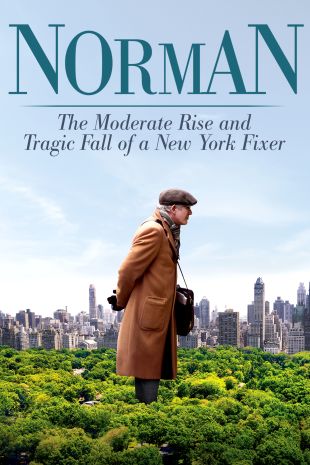
If Norman Oppenheimer (Richard Gere) were a real Manhattan mover and shaker, he'd be forgiven all of his unendearing character traits: He's a compulsively lying, name-dropping schemer who weasels his way into dinner parties, accosts businessmen on their morning jog in Central Park with a "great opportunity," and hands out business cards for his "consulting firm" (no address, just a cell-phone number) with the same zeal as those guys flicking strip-club flyers at every passerby in Times Square. He's a dollar-hungry coyote in a camel-hair overcoat, prowling Manhattan's sidewalk canyons in search of the big payoffs he thinks he's close enough to sniff. To be blunt, his character embodies a particular kind of ethnic stereotype to such a degree that audiences might be asking themselves: Why, exactly, did the Jerusalem Film and Television Fund and the Israeli Film Council bankroll this movie?
But no one can hate Richard Gere and his warm, crinkly eyes for too long, and so we forgive Norman's harmless mendacities about his dear departed wife and the powerful friends he thinks he has because it would be so nice to know someone like him, that rare breed of person who can make you feel special by talking about himself. No one is immune from his relentless networking, not even embittered Israeli politician Micha Eshel (Israeli cinema's leading man Lior Ashkenazi, who looks like the sensuous love child of Mikhail Baryshnikov and Steve Carell). Eshel is walking off the disappointment of another wearying international conference with some window-shopping before he returns home to Israel, and that's when Norman spots him admiring a pair of bespoke shoes at a menswear boutique. We don't hear what Norman says to him, but we watch both men through the shop window in a beautiful, rich pantomime. Norman sidles up, makes a comment. Micha says something noncommittal, and Norman edges into the invitation. He moves closer, chatting, smiling, touching his arm, letting loose with a joke and grabbing the man's shoulder just as they burst into a shared guffaw. He's like the aikido master of kibitzing.
What exactly does Norman get out of all this frantic friendliness? Whatever his business strategy is, it's not working, because he's still dining on Ritz Crackers and pickled herring in the kitchen of a synagogue where a tolerant rabbi (Steve Buscemi) takes pity on him. He's not looking for a reward in heaven, that's for sure, but three years pass without any concrete fattening of his bank account. Then he receives word that his pal Micha, the government functionary he once befriended, has become the prime minister of Israel. Norman is suddenly living out the adage of the dog who chases cars without knowing what to do if it caught one.
What threatens to be a very unflattering portrait of a stereotype becomes, in director Joseph Cedar's capable hands, a character study nestled into a near-Talmudic parable about tikkun olam, the Jewish imperative to "repair the world." Norman Oppenheimer might share a surname with the theoretical physicist who unleashed the atom bomb on humanity (and his exasperating behavior certainly inspires many acquaintances to nuclear meltdown), but his own Manhattan project results in unwitting creation, not destruction. (An extended montage of Norman's frantic phone calls trying to broker a complicated deal is the best visualization of cell-phone exchanges this critic has ever seen in the movies, with split screens blended between the locations of each call -- such as, say, a boardroom combined with an office-supply store -- so that the two parties seem to occupy the same conversational space.) Norman lives the life of someone who personifies the truism that "people will forget what you say and what you do, but they will never forget how you make them feel." That goes double for the film itself.
